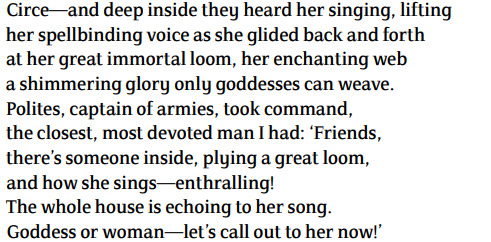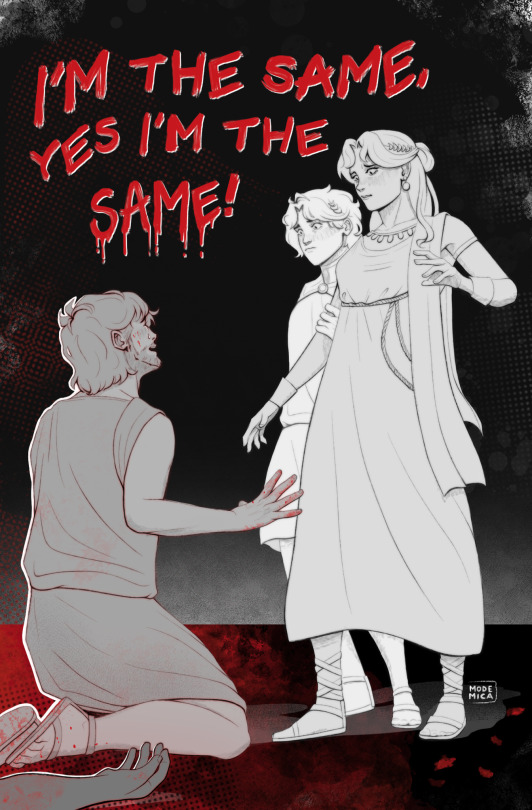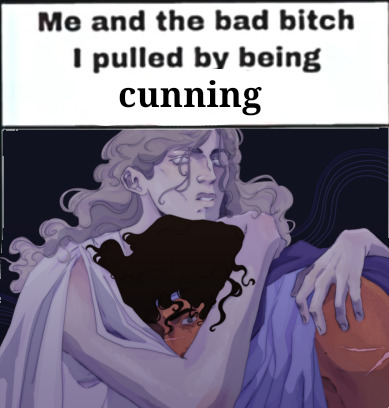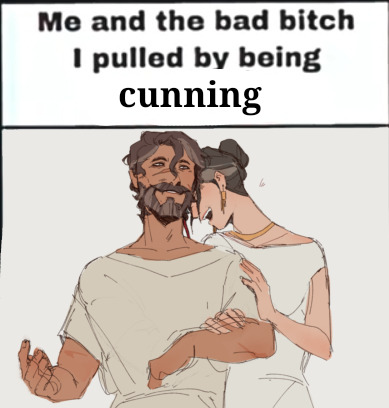#odysseus/penelope
Text
This is how Penelope is first PHYSICALLY introduced in the Odyssey as it's when she first speaks.

(Fagles, Book 1)
This is how the other women whom Odysseus gets with (aka assaulted by) are first physically introduced:

(Fagles, Book 10)

(Fagles, Book 5)
The two goddesses are singing during their introduction while the woman he loves says to stop, granted at the bard but I just think it's interesting. I'm definitely thinking it wasn't on purpose by Homer but I wanted to point it out.
Penelope never needs to enchant/sing to Odysseus to "lure" and/or entice him because that's where he wants to be in the first place.
#granted he's still in disguise when they see each other again for the first time but I got excited when I realized this and just wanted to#share#feel free to add to this.#this was mostly for fun but I will probably use this later on in an essay sort of thing I wanna write#this is all over the place as I'm very tired and sore right now but eh#penelope#odysseus#odyssey#odypen#odysseus and penelope#the odyssey#odysseus x penelope#penelope odyssey#odysseus/penelope#circe#calypso#tagamemnon#mythology#greek mythology#mine#tw assault mention#tw assault#tw sa#Mad rambles#shot by odysseus#essay
250 notes
·
View notes
Text
Haha angst go brrrr
Animation by @gigizetz (it's beautiful go watch it)
#greek mythology#odyssey#homer's odyssey#homer#odysseus#the illiad#illiad#odypen#homer's iliad#penelope odyssey#odysseus and penelope#odysseus/penelope#penelopeofithaca#odysseus x penelope#penelope#Angst#the trojan war#circe#circe goddess#epic the musical#epic the troy saga#Epic the circe saga#animation#Edit#gonna cry
502 notes
·
View notes
Text
Odyssey - an opinion on Odysseus
Tw: reference to sexual assault, coercision, rape in abstract terms as themes.
Currently reading the Odyssey for the first time and there are 2 interpretations it feels like you can make with Odysseus and his intereactions with characters like Calypso.
He's an unloyal twat who willingly sleeps with everyone woman he can (I feel like this seems to be the most popular female oriented take from what I know of a lot of modern retellings)
That actually, Odysseus has very little choice. The women he sleeps with are goddesses who entrap him in someway and the reality is that his one consistent goal is to get back to Penelope, the clever wife he loves. In effect Odysseus pretty much is being coerced and forced into these sexual relationships. Take Calypso for example, he can't kill her, can't leave, can't persuade her to let him go. He spends the years he's there crying, sobbing, desperate to leave but lays in her bed at night when she asks him to. This to me doesn't seem like a man who wants to be doing that, wants to be betraying his wife, but instead a man who has little choice. Admittedly as well, it's made clear that the goddesses (Calypso and Circe) have a sort of magic when it comes to coercing and getting people to do what they want and it's made clear that Calypso's goal is to have Odysseus stay as her husband forever. The moment he has a chance to leave, after Hermes forces Calypso's hand, he does so, refusing to stay and turning down immortality and by all accounts one of the most beautiful creatures on the planet. There are multiple women, mortal and immortal, in the books who are described as desiring Odysseus and as extremely beautiful. The immortal he sleeps with, but the mortal he does not despite the opportunities afforded him. This to me suggests he only sleeps with the immortal ones because he has very little real choice, who is he to go against a goddess? I personally believe that if he had a real choice, he would have been celibate for those 20 years until he returned home.
I think it's really easy to judge Odysseus at face value, that he's a cheat and liar and that he didn't have to do these things. But to me, my personal interpretation (which is what it is, you can have a different one and that's fine!) is that this man, this highly intelligent man, adores his wife, wants to be back home, but has very little choice. That at best he sleeps with these goddesses knowing that it will enable his survival and at worst he's literally forced through the coercive nature that is a goddess and her powers. It doesn't seem to me, especially with Calypso, that he wants to be there, that he really wants her or cares for her or desires her, it seems like a motion, something he has to do because he's forced to. This man spends his entire time crying and I suspect if he could have he would have killed her, but who can kill a goddess? A daughter of Atlas? Certainly not him.
It strikes me as well, that if he really were that much of a rake, then the mortal women he comes across who are described as beautiful and desiring him, he would also sleep with or even marry and stay with. But he doesn't.
It may be an unpopular interpretation, but I actually really like Odysseus and I personally believe he has little choice in these flawed actions and that in reality he's a victim, I don't believe Homer puts it forth as some sort of romantic ideal or the hero being rewarded.
Obviously, you don't have to agree. You can have your own opinion and that's fine.
#That being said I've only just got past Circe so maybe there's other parts of the story I haven't gotten to yet#but I'm a penelope/odysseus stan and I 'm tempted to rewrite the odyssey with odysseus very clearly a victim#it doesn't feel like he's this rake that people put him as in my opinion#the odyssey#odysseus#odysseus/penelope
133 notes
·
View notes
Text
The Wolf and the Spider
Chapters 24 through 26 are up on Ao3!
After seven years apart, Odysseus sets out to Sparta to win Penelope’s hand. But when her outcast uncle, Hippocoon, gets there first and seizes the palace, Penelope escapes with her cousins and finds a reluctant ally to protect them. With Sparta in chaos and the armies of the Peloponnese scattered, Odysseus must rely on the ambitious Agamemnon to unite the kingdoms and find Penelope.
AKA an adaptation/combination of the Oath and Hippocoon's attack on Sparta. It's a sequel to my other fic, The Weaver and the Carver.
#the odyssey#odysseus#penelope#odypen#odysseus/penelope#diomedes#teucer#ajax#agamemnon#heracles#helen#clytemnestra#ancient greek fic#epic the musical#fanfiction#the illiad
17 notes
·
View notes
Photo

Doubt Truth to Be a Liar // But Never Doubt I Love
(a short story examining Homer’s Odyssey, originally published here with full tag list as “I Remember Mornings”. content of this post rated E.)
Homecomings and long waits are never easy. When the one coming home is almost certainly a god in your husband’s shape, they’re harder still. If Penelope is to emerge with her virtue intact from this final challenge, she must think as quickly and as craftily as Odysseus.
I - Doubt Truth to Be a Liar
“My lady!”
A hand upon her arm, and then a second on its twin, pushing and shaking, to draw her from sleep. She groaned, her head shaking, her hair unbound and falling over her back.
“My lady!”
The same voice, again, and a familiar one. Eurykleia, she thought, shivering and flinching as she woke all at once and sat up, her heart pounding in her ears and filling her veins with ice. Something was wrong. Something had to be wrong.
She snatched up a blanket, pulling it as high as it could go until it covered her to her shoulders, and her eyes found the door. Empty. Her strength was gone as quickly as it had come, and she sagged back into the furs, letting her eyes close again. She was alone. She was alone in her own room in her marriage-bed, save for one slave whose loyalty had never faltered. But then why - ?
“Child, get up,” the old woman bade her, and her voice had a strength to it that had been gone for three years. “Get up! Your lord husband the king has returned!”
Sleep clung to her eyes, to her limbs, to her thoughts. She forced herself to speak, to consider what had been said; the words were little better than murmurs, or the crying of birds.
“What… ?”
“Odysseus has returned!” her slave repeated, and her smile was so broad it might have cloven her wrinkled face in two. “He has come, at last, and slain every last man who might have harmed you or your noble son!”
“... you’ve woken me from a dream of peace to tell me you’ve gone mad,” she answered, shaking her head and fighting to keep the bitterness from her voice. She was well and truly awake, now, far from the blissful, gentle oblivion that Morpheus had granted her, and as it slipped from her fingers she found it replaced with anger. “And I haven’t slept so soundly since my lord sailed to war!” The shaking of her head seemed to continue on without her command, a self-perpetuating motion that unmoored her heart once more. “You rob me of that for flights of fancy, for the gods turning your world upon its head? No. Hardly.”
She dropped back to the bed, turning away from Eurykleia, raising her shoulder as high as she might.
“Go downstairs,” she ordered, “and if some other slave comes to me I won’t be half so gentle. Your old age has earned you leniency.”
“My lady,” the old woman said, and her words seemed to bring a chill to the air, “I am not mad, I am not deluded, nor am I god-touched. He has come, my lady, at last, at last!”
She opened her eyes again; she was clutching the blanket, woven by her own hands, brought by her to the marriage-bed. A chill ran up and down her back, racing between head and hips; this time, when her heart thundered, it seemed to whisper of the storm.
“The beggar your guests were so cruel to,” Eurykleia said, “the one who strung the bow, my lady? That - that was him, cleverly disguised, hiding from all who might have done him harm!”
Before she realized it, she had sat up again, not bothering to cover herself but clinging to the blanket.
“What?!”
“He came in secret!” the slave cried, shaking with glee and grinning even more widely than before. “He and Telemachus - they plotted it together, the pair of them! He knew, he kept it secret, so his father might take revenge upon those who’ve despoiled this house!”
The cry that wrenched itself from her lips must surely have been heard on distant Olympus, and the flood of joyful, incredulous tears had to have come straight from the sea. He had come. He had come. He would end this misery, somehow, would save her, would safeguard her. He would drive out all who laid claim to what was his, and bring justice, and fill her lonely, aching nights, surely, surely -
She fell into Eurykleia’s arms, clinging to the woman, the thrice-blessed and thrice-beloved nurse who had as good as raised her lord, her king.
“I’m saved,” she said, the words mangled by hair and mantle and flesh and bone, “I’m saved, he’s come for me - !”
She froze, fear once more stabbing up from her belly and into her chest. Her hands were shaking. Slain, she thought, shaking her head once more. Slain. She said -
“You said he’s - he’s killed all of them?”
“To a man, my lady!” Eurykleia crowed.
No, she thought, sinking back onto the floor by the bed. No.
“No,” she said aloud, “no - no man might - alone? How - how could he, when they were so many, and he had only our son by his side?”
She watched her slave’s face desperately, feverishly, hoping against hope that the answer would not be what she feared.
“Truth be told, my lady, I know not,” Eurykleia admitted, and the fear turned to grief and bile, and she wanted to scream a second time. “I know only that the doors were sealed, and that from within we heard a terrible sound of battle.”
“We?”
“All who remained loyal to him, those who were left behind and never faltered. We kept back from the door, and hid until the awful cries and clash of arms were over, and then - !”
“Then?”
“Then, my lady, I opened the door, and I saw the pair of them, my lord Odysseus and Telemachus his son, standing atop the corpses of every last man who ever came calling for your hand! Oh, you would have gasped to see him there, drenched in blood like a lion fresh from the kill!”
Her heart was pounding again, and she would have torn the blanket if it had been made by the hands of a lesser weaver. All of them. All of them at once, in one room. He - he cannot be my lord king, whose cunning and guile is legendary but whose strength of arms is not that of Ajax or Achilles.
Eurykleia pressed on, unaware of her mistress’s distress. “He’s piled the bodies and he means to purify the house with fire, to make this place lovely and whole again! He sent me to fetch you - come, come!”
“You were sent, surely,” she answered, and her voice was somehow grave and confident, “but by a god, and not my lord. Some - some god has come, and slain those vying for my hand for their crimes and offenses, for who but a god might do such a thing?” And he summons me to his side, as Apollo summoned Chrysorthe, as Zeus summoned Semele, and I may not refuse him. She looked past Eurykleia, to the empty door, which now seemed to have the likeness of a gaping mouth, with steps beyond it stretching down to the ferryman, and Hades beyond.
“He’s not a god, my lady!” Eurykleia insisted, as she rose listlessly and took up a length of linen for a peplos, pinning it in place at her shoulders. “I washed him, I found the scar from the boar! He bade me keep silent, else I’d have told you! It’s him!”
“The gods have their ways of coming and going, their tricks to trip up hapless mortals,” she replied, and began to bind up her hair. Zeus. It must be he, Alastor, Xenios, and now he has avenged the wrongs of man and spilled blood for the affront to guest-right he claims his prize.
“I would know if this were a trick, my lady! If - if I lie, if I tell you a falsehood? Kill me. You shall have earned the right.”
She shook her head. “I won’t kill you. Not for that.” Her hands dropped to her sides, empty without thread and shuttle. She was dressed, if hollow-eyed and miserable. “But - let us go and see my son, at least, and I may bear witness to the dead, and the man who slew them.” It seemed as if someone else was speaking, someone else, someone who was not sick with fear and fury at her fate, someone who was lifeless and resigned.
She let herself be led down the stairs by her lord’s nurse, who took her by the hand and brought her to the threshold of the courtyard. Each step felt as if it took her away from herself, further into darkness, into death, and indeed, here she was surrounded by the dead, their bodies laid out and prepared for the pyre. Before him was her son, busy with the flames and with the household - her own handmaidens, her much-beloved attendants, who had never forsaken her, and who walked among the corpses of their traitorous sisters as if they trod through fields of flowers. And…
… and him.
Tall, broad-shouldered, nobly erect despite a beggar’s rags, giving orders to what few men remained - she would have known him anywhere. She took three steps at a run before recalling at once what had happened, forcing her legs to halt and keep still with such force it nearly sent her sprawling to the floor. Somehow, she kept her footing, even as everything that tied her bones together demanded that she run to him, that she take his face in her hands and kiss him until the years ceased to matter.
But he was a god, in the shape of her lord husband, and she should not fall into his trap so easily.
She crossed the threshold, and found a seat by one of the fires, and watched him until he felt the prick of her eyes upon him and turned to see her. She watched his face turn soft, and yearning, and her resolve nearly broke into pieces. You know him, her heart whispered. You know him.
But - did she?
They watched one another for perhaps a breath’s worth of time, and perhaps a year, and soon Telemachus her son caught sight of their faces and their eyes, and he came up to her still almost shining with righteous fury.
“How can you sit by, Mother?” he demanded, gesturing to the stranger in her husband’s guise. “How can you be so cruel, to not welcome him? Not love him, when he has done all this for you?”
“Telemachus,” the stranger said, sounding so like him that it nearly made her weep. Her son persisted.
“You’re eternally hard-hearted,” he accused, “harder yet than stone! No woman in the world would be so cold, to sit there and watch him, as if he is not your master and my kingly father!”
She did not look at the stranger’s face as she answered, fixing her gaze upon his hands.
“I cannot speak,” she said, “nor meet his eyes so easily.” She let her head turn toward Telemachus, her eyes darting back toward the stranger now and again. If it is a god who has found me, he will know he has not caught me unawares.
“But - !”
“Child,” she said, “if it is your father, my Odysseus, who has come to me? We…”
Her breath caught in her throat. An answer, unlooked-for, had come to her, green sprouting out of the barren rock surrounding them all. She gathered up her gown into her hands, reminding herself of every thread’s place in warp and weft as she spoke.
“We have secret signs, that might reveal to us the truth of who we are.”
The stranger sighed, and began to smile, turning to her son.
“While I am dressed thusly,” he said, “she will not turn her head to look at me!” As plainly as if it had been spoken, She swore I would never be poorly dressed followed after, an echo of their last day before the summons to war. There were tears in her eyes, and while her son was drawn into some debate, she watched as the world shrank to the ends of her fingertips and her ears filled with wax. Perhaps I will not conceive. Perhaps he only wants me for a night, and will be satisfied. Perhaps I might leave this place and fly to Delphi and beg for a way to save myself from Hera’s wrath. Perhaps it is not Zeus at all, and so I am doomed, or saved. She sat, silent, still as the stone her home was built of, awaiting the end, numb and shivering.
And then someone sat opposite her, facing her, and suddenly there was a room again, and a courtyard, and a blazing, fragrant fire, and she was looking at Odysseus, clad in his own mantle and chiton, clean and gleaming in the rising and falling light, and watching her.
“Extraordinary woman,” he said, “to be so hard to me.”
“Extraordinary man,” she answered, “to expect me to be surprised by the face of one I lost some twenty years past.” She dared not be angry. He was a god, and gods were fickle. Better to catch him out in a lie, and then perhaps be rewarded, than to be mother to his bastard.
Anger flickered in his eyes, despite all her care, and she clung to her gown to quiet the fear that rose up to choke her.
“Eurykleia,” he said, not looking away from her for even a moment, “if I am to be cast out in my own house, make me up a bed, that I might face such poor treatment in the morning after I have rested.”
He had fallen straight into her trap, and hadn’t even realized it. She forced herself not to gasp, instead drawing in a deep breath, and answering with her own order.
“Yes,” she said, and prayed, and hoped, her voice would not betray her. “He is the master of this house, he ought to have a bed.” Another breath, in and out. “His own bed.” He looked at her, something shifting in his face, and she pressed her advantage.
“Have it brought into the hall, and pile it high with furs, and he may pass the night in the comfort of the thing he made.”
She had hoped for a quick, effortless answer. An affirmation, an agreement, that might have shown the truth of who it was before her.
But this man ignited.
“Kataibates, woman!” he shouted, standing up so quickly he sent his chair falling back until it cracked against the stone. He stepped across the distance between them, looming over her, arms gripping her own chair until it shook. “Who dared to move my bed?”
What?
She stared up at him, mouth falling open, watching rage and despair run over the face she had known so well in dreams and memory. He glared at her, hands twitching; she wondered if he would strike her.
“I,” she tried, and failed, snapping like weak thread spun by lesser hands, “I - !”
“The bed I carved myself?” he demanded, so close she could almost feel the trembling in the air. “The bed formed from the trunk of an olive tree? The bed I made you? Who? Who has seen it? Who has broken it? What man did I honor with a burial when I ought to have fed him to the dogs? How - ?”
But she had flung her arms about his neck, forcing his silence with her own weeping. Not a god. Not a god. Impossible, and yet true.
“Show mercy, my lord, and do not raise your hand to me in anger!” she pled, clinging to him, her tears soaking his mantle, the mantle she had made. He wrenched her free of him, eyes still blazing, and she flinched back and felt her hands rise above her head.
“Please,” she begged, “please, Odysseus, I - !”
He froze, even as he held her, staring at her, gaping at the sound of his name from her lips.
“I thought… I live in terror of treachery, my lord!” she said, feeling his grip loose, hoping that she spoke quickly enough to tell all before his patience wore away entirely. “Of liars, and thieves, who would trick their way into my bed, your bed, and be off with all that’s yours and with me.” She wept openly, and thought she glimpsed the gleam of tears in his own eyes.
“Helen,” she continued, “she - she never would have left her home, or abandoned her duties, or her lord, were it not for a god, and - and I thought - with all my suitors slain, and only one man, surely - !”
A deep, bone-weary groan filled the air between them; it had come from Odysseus.
“But - but you told the secret of our bed,” she finished, the tears blinding her. “You, and you alone, have seen it. No other slipped past my stone heart. Not one. I - I swear it.”
He let go of her, releasing her for one agonizing moment that filled all the years as his eyes devoured every inch of her and kindled a spark within her that had lain lonely and drowned by sorrow for many a long night.
“Penelope,” he said, and when she wept anew he drew her back into his arms and clung to her.
(chapter two, rated M, posted at the above link and here.)
43 notes
·
View notes
Text
The Story by Brandi Carlile is such an Odysseus/Penelope song!

(specifically when they’ve finally reunited and Odysseus is telling her the full story of his journey home)
#tagamemnon#odypen#odysseus#the odyssey#odysseus/Penelope#penelope#I am working on a playlist for them currently#it’s gonna be a good one
8 notes
·
View notes
Text
Mildly shameless self-promotion; here, have my Odyssey AU Fanfic.
#the odyssey#Homer’s Odyssey#homer’s iliad#odysseus#astyanax#odysseus/penelope#odypen#au canon divergence#Odysseus saves Astyanax and adopts him
25 notes
·
View notes
Text

something something green knight au
#art#digital art#tagamemnon#odysseus#diomedes#penelope#odyssey#iliad#greek mythology#arthuriana#gawain and the green knight
13K notes
·
View notes
Text
#I'd add more but the two options only is funnier#other scrapped ships include:#orpheus/eurdydice#psyche/Eros#odysseus/penelope
0 notes
Text

“I keep on trying to embrace you both, why won’t you let me?”
#epic the musical#the odyssey#odysseus#penelope#telemachus#the ocean saga#my art#greek mythology#ok listen guys i needed to get an epic drawing out of my system#i just had to omg
4K notes
·
View notes
Text
youtube
I've always imagined Odypen's style of flirting like this but just them telling riddles and just outwitting and messing with each other until they just start kissing.
However, they def would do this even while negotiating trade/settling disputes/ruling in general/etc and other people would just have to deal with it, ESPECIALLY after reunion.
Telemachus usually just takes over talking on behalf of Ithaca, being that he would be king one day anyway.
He loves them and he's happy for them but he's T I R E D.
#odyssey#odypen#odysseus and penelope#odysseus x penelope#odysseus#the odyssey#odysseus/penelope#penelope odyssey#telemachus#might write a fic about this idk#tagamemnon#homer#They just love each other alright?!#Yay a contribution to the fandom#the addams family#Gomez and Odysseus: just 2 goofy doods who love their cool wife#rightfully so#hope I tagged this right?#kind of inappropriate but idk if I should tag as mature or not#oh well#let me know#Youtube#greek mythology#mythology#Mad rambles#shot by odysseus
34 notes
·
View notes
Text
Odysseus and his bad bitch ❤️

Multiple versions:



Yes they're all cunning because he is cunning, Odysseus is cunning
#greek mythology#odyssey#homer's odyssey#homer#odysseus#the illiad#illiad#homer's iliad#odypen#Odydio#diomedes#penelopeofithaca#odysseus x penelope#penelope odyssey#odysseus and penelope#penelope#athena#pallas athena#odysseusofithaca#odysseus/penelope#odysseus x athena#didnt know that was a tag#but here we are#odysseus and diomedes#odysseus x diomedes#odysseus/diomedes#poly#theyre in love your honor
458 notes
·
View notes
Text
Thread of Fate

Pairing: Odysseus x Penelope
Writer: @writings-of-a-hufflepuff
Rating: G
Warnings: references is rape/sexual assault, nothing explicit but I don't interpret his relationship with Calypso as consensual. Angst
Summary: Even if he dies on this island, even if he becomes a hollow shell of a man, the last remaining embers of his soul will always be, Penelope’s.
Notes: I'm reading the Odyssey at the moment and I just have feelings y'know...
Archiveofourown
It is like Hell on earth, as if he has been sent to Hades, not the Asphodel Fields, certainly not to Elysium, but to Tartarus. Eternal damnation and torment, day in, day out, night by night. Perhaps this is the price he pays for the many tricks he has played, for his arrogance when faced with Polyphemus, his brutish boasts of intelligence. Perhaps Athene has forsaken him for his hubris, he has been tossed ashore to this island to suffer torment. Ogygia his own personal Hell. Perhaps it is penance for leaving his wife, his dear Penelope, to fight another man’s war? All for the love of her cousin, that fair Helen of Troy, who so many claimed was more beautiful than she. He had always disagreed on such a point. While suitors clamoured for Helen’s hand, he had desired the great Penelope’s, with her cunning wit, her beautiful dark locks and sharp blue eyes. And he had won her hand, he had gained a wife he loved so dearly, only to lose her to another man’s war.
Perhaps, she already believed him dead. Perhaps she had taken another husband such as Antinous, that lout, that curr, that wretched man who had always coveted what others had. But, no, he knows she has not. There is a thread of fate that ties him to Penelope, a string that has not been cut, nor diminished even in his absence. He yearns to follow that string, across the oceans once more, he has come so far and yet still has so long to go. Had he simply avoided every stop, every temptation upon the way. Had his crew been more loyal, greater men, less swayed by temptation. But, he knows the truth. The truth is…had he not been so arrogant as to mock and curse the son of a God, even a cyclops like Polyphemus, had he not been so desperate to fight another man’s war like Menelaus'…perhaps, he would not have wasted seventeen long years already. His son would be grown by now. His wife, waiting and hoping, while all around her promised that he would not return, that he must be dead. His beautiful, intelligent, cunning wife. Who he had told he would be back soon. Who he had promised more children…who would likely never have another. His son, Telemachus, who did not know his fathers face nor his voice nor his love. His son…did his son survive infancy? Or had he lost his only child as well as so many years of his life?
The thoughts suffuse his mind by day, as he cries, sobbing on the shore, eyes turned towards the direction of Home, of Ithaca, of Penelope. The sun does not console him, the birds singing sweet songs cannot soothe him, the sea breeze cannot tame his melancholy.
By night, he is forced to warm Calypso's bed, eyes blank, heart tight and clenched, as clenched as his eyes as he forces tears to hide behind his lids. What makes it bearable, survivable is the thought of Penelope. There are nights where Calypso, knowing he will not look at her as she uses his body, steals Penelope’s voice, but it is wrong, so very wrong. His Penelope does not call him her darling, his Penelope does not trill sweetly at him, her bite always sharp and witty. Love making with his own Penelope, was a battle, a hard thought victory where both were winners no matter the outcome. With Calypso he is uninvolved, she takes what she wishes and he accepts his fate, while cursing the Gods and praying that Penelope will understand, that she does not feel their marriage bed is despoiled, that she does not feel betrayed by his acts of survival.
He spends his time focusing on her image, while avoiding thoughts that he will never see her again. He consoles himself with memories of her all the while Calypso claws at him in desperate attempts to ensnare and keep him. But she will never have him. He was never for sale, never for barter, never an option. He is, has been and always will be Penelope’s Odysseus, even if he never sees her again.
There is no other woman for him, but Penelope and he hopes, however selfish it may be, that he is the only man for her. That whatever suitors have come scratching at her door, like vultures circling a carcass, have found their prospects dim, their efforts wasted.
Even if he dies on this island, even if he becomes a hollow shell of a man, the last remaining embers of his soul will always be, Penelope’s.
26 notes
·
View notes
Text
The Weaver and the Carver
https://archiveofourown.org/works/47467498/chapters/119622289
After a pair of intruders break into the Spartan palace during an Argonaut reunion, fourteen-year-old Penelope sets out to find the culprits before they can hurt her family, but she'll need help from the only person who believes her: the infamous Odysseus.
AKA A story of Penelope/Odysseus meeting set to the events of Helen's first kidnapping.
#penelope#odysseus#the odyssey#the illiad#ancient greek fic#fanfiction#athena#theseus#short story#epic the musical#odypen#odysseus x penelope#madeline miller#odyssey#homer#odysseus/penelope
53 notes
·
View notes
Text
penelope didn't have to turn the tree bed into a riddle. she could have asked odysseus to prove his identity, to tell her something only he would know — which she actually did a few books earlier, when she asked the beggar to describe odysseus, and odysseus told her about a purple cloak with a particular golden brooch that she fastened herself twenty years ago. when penelope tells telemachus they have signs by which they'll know each other, you sort of expect more of the same. and instead, she decides to trap him. like a bug in a cup.
and it's delightful to me, idk, how odysseus has been trapped and cornered in various way throughout the odyssey, but arguably never so that he has to tell the truth to get out. (with the phaeacians, maybe? the omniscient narrator corroborates some of what he tells them, but do we really know everything?) and in fact he is not trying to get free of penelope. he wants something from her, wants to convince her, wants to be welcomed home, but until this point he's lied to her, revealed himself to other people before her, and been distant with her (though also patient! he doesn't try to strongarm or rush her into accepting him; it's his idea to sleep elsewhere).
except penelope isn't looking for him to be distant and patient. penelope lies in a way that requires odysseus to stop playing along — not only to prove that he knows what odysseus knows, but that he's willing to tell the truth about himself.
2K notes
·
View notes
Text
My dealer: got some straight gas 🔥😛 this strain is called “the slaughter of the suitors” 😳 you’ll be zonked out of your gourd 💯
Me: yeah whatever. I don’t feel shit.
5 minutes later: dude I swear I just saw that beggar hiding our weapons
My buddy Antinous pacing: Penelope is lying to us
6K notes
·
View notes